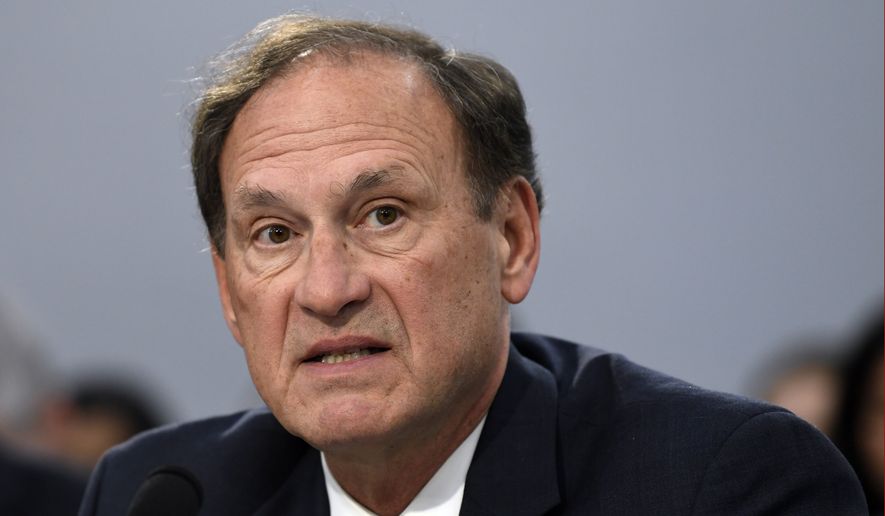OPINION:
Religious freedom is one of the defining features of the United States. But it has been under assault for years and now it faces a new wave of threats. And it could evaporate before our eyes if it doesn’t have enough powerful defenders.
We’re lucky, therefore, that it has a champion in one of the few high-ranking public figures whose influence doesn’t depend on the whim of a volatile electorate. A Supreme Court justice, no less: Samuel A. Alito.
Justice Alito was this year’s keynote speaker for the Federalist Society’s Annual Lawyers’ Convention. What they heard was extraordinary: a top jurist’s analysis of current threats to religious liberty.
While “not diminishing the severity of the virus’ threat to public health” or questioning the legality of COVID-19 restrictions, the pandemic had created “previously unimaginable restrictions on individual liberty,” he said. “It pains me to say this, but in certain quarters religious liberty is fast becoming a disfavored right.”
He deplored a Nevada public-health order capping attendance at services while other places in the state — including Vegas casinos — were permitted to admit larger numbers. (Filed with Justice Stephen Breyer on the same day as Justice Alito’s keynote was a request by the Archdiocese of Brooklyn to block state restrictions on in-person church attendance.)
The anxieties about religious freedom Justice Alito expressed in his keynote were largely a compilation drawn from his judicial opinions on the subject. In fact, he has been sounding the alarm throughout 2020. In a trio of religious freedom cases decided this summer by the Supreme Court, Justice Alito was vocal.
In Espinoza v. Montana Department of Revenue, the court struck down a Montana No-Aid provision used to exclude religious schools as recipients of state-endorsed private scholarships. Justice Alito’s concurring opinion highlighted the anti-Catholic bigotry behind the law’s passage over 100 years prior.
Justice Alito also authored the majority opinion in Our Lady of Guadalupe School v. Morrissey-Berru, applying the First Amendment’s ministerial exemption to teachers of religion at Catholic schools. He explained: “Judicial review of the way in which religious schools discharge those responsibilities would undermine the independence of religious institutions in a way that the First Amendment does not tolerate.”
And, in the Little Sisters of the Poor’s most recent appearance before the Supreme Court in defense of their right to object to the Affordable Care Act’s “contraceptive mandate,” Justice Alito asserted in a concurring opinion that “in my judgment, [the Religious Freedom Restoration Act] compels an exemption for the Little Sisters and any other employer with a similar objection to what has been called the accommodation to the contraceptive mandate.”
“For many today, religious liberty is not a cherished freedom …. Even when there is no evidence that anybody has been harmed,” remarked Justice Alito during the keynote earlier this month. “As far as I’m aware, not one employee of the Little Sisters’ has come forward and demanded contraceptives under the Little Sisters’ plan.”
Is 21st-century America still “inclusive enough” to tolerate people with “unpopular religious beliefs?” We could be just about to find out.
Justice Alito and his colleagues on the Supreme Court are considering a case raising this very question. Earlier this month, it heard oral argument in Fulton v. Philadelphia. The Archdiocese of Philadelphia lost its decades-old foster care placement contract because of its sincerely held religious beliefs about what is best for children.They are willing to refer any same-sex couple that ever comes to them (none ever had) to one of the 29 other agencies working with the city.
Although city officials up to this point have been brazenly intolerant of the Catholic agency’s sincerely held beliefs, the First Amendment demands a more inclusive approach. (I wouldn’t be surprised to learn that Judge Alito is busy drafting the court’s opinion directing the city to reinstate the agency’s contract.)
Religious freedom in America protects churches, religious schools and churchgoers from facing burdensome scrutiny and disparate regulation by the government, even during a pandemic. It allows religious organizations and people of faith to participate in society without having to leave their beliefs at the door.
And now, incredibly, we’re in danger of losing this precious legacy. At a time of immense social turmoil, America needs a champion of religious freedom. Fortunately, Justice Alito has answered the call and is urging the rest of America to join him.
• Andrea Picciotti-Bayer is director of the Conscience Project, an organization advancing conscience rights through public education and amicus support in religious freedom cases.




Please read our comment policy before commenting.